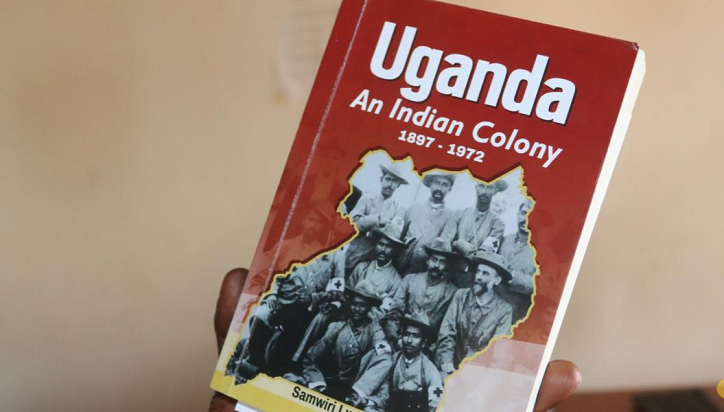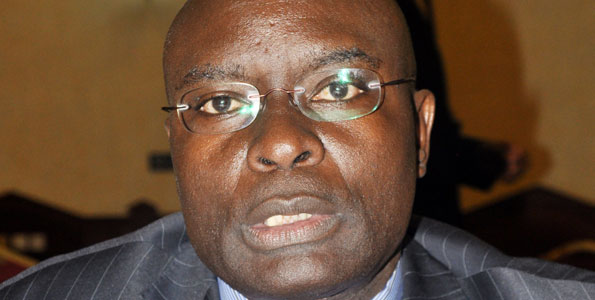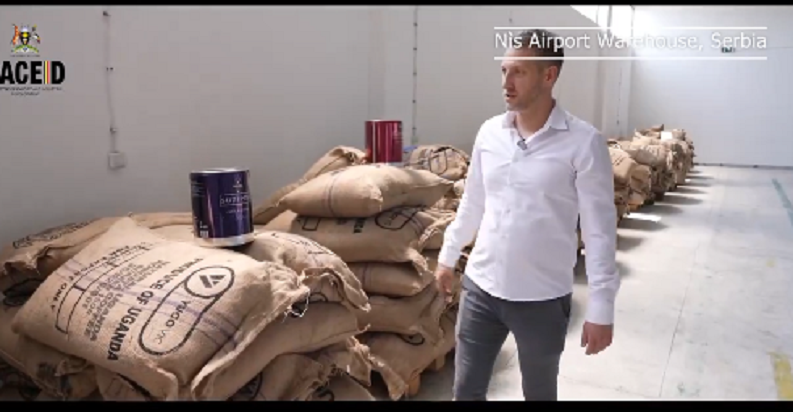Prof Samwiri Lwanga-Lunyiigo’s new book
The professor has done it again. Prof Samwiri Lwanga-Lunyiigo, historian and author of the “Mwanga II” book fame that caused the rehabilitation of the last sovereign king of Buganda in many a mind, is at in his element again with a new title that not only spell out how Indians economically dominated Uganda up to when they were expelled but also provokes debate on the economic independence of locals in the country today.
The well-researched and provocative book titled Uganda an Indian Colony 1897-1972 is coming to the shelves when Uganda marks 50 years of the expulsion of Indians (in August 1972) by President Idi Amin who accused them of economic sabotage, including acts such as tax evasion, corruption, and other illegal dealings.
Recently launched at Imperial Royale Hotel, interestingly owned by a Ugandan of Indian origin, the book gives insights into the commercial life of native Ugandans who were structurally left into poverty and milked in taxes and labour as the fifty Indian families, benefited from their sweat on the watch of the colonial government and the first establishments after independence.
“…to both Europeans and Indians, native Ugandan were mere beasts of burden, to provide labour in their homes, to lift their heavy loads…to grow exports, especially coffee and cotton and pay heavy taxes,” the book reads in part, later giving evidence on how the Indians dominated the economy during colonial times and ten years after the political independence.
With evidence, Prof Lwanga-Lunyiigo shows how the Indians who were just one percent of the then 8 million people who lived in Uganda controlled the 75 percent of the economy but only paid 5.4 percent in taxes and after all the profits were repatriated without investing it in Uganda.
For instance, Lunyiigo points out that between 1955 and 1972 there was an outflow of capital from Uganda averaging around £12 million a year reaching a peak of £17.2 in 1958. The Indians who had made a fortune preferred to send their earnings out of Uganda rather than reinvesting yet there was an acute shortage of development funds in East Africa.
Debunking the myth of Indians having special business brilliance, Lunyingo’s book seems to be pointing out that this minority group was just organized and seized the opportunity with help of legal backing from the British leader most of which were coming from India, which was also under the British sphere of influence.
The historian demonstrates how the colonial authority repressed and, as a result, eliminated indigenous businesses (pottery, iron smelting, salt, export commerce, ceramics) that had existed long before colonization, reducing locals to basic labourers and raw material producers. The Indians eventually took over the economy, dominating the industry, agriculture value addition and marketing, and public service, as well as all aspects of commerce, including wholesale, retail, and international trade; export and import.
“Indians dominated all trading centres, big or small and penetrated the country to the remotest villages looking for money. And in their quest for money, their fellow imperialist, the British were complicit. The British made all the legal arrangements which enabled the Indians to milk, to use the words of General Idi Amin, the native.”
The book also points to the fact that Indians determined the prices of cash crops paying a fraction of what cotton and coffee grown by native Uganda were worth. Lunyiigo also gives evidence-based cases where Indians also stole the produce of the Natives. To make matters worse, the little that the Ugandans had made was also taken away by forcing them to pay many high taxes to an extent that some natives committed suicide because of the taxes.
As imperialists, Indians – with Europeans- opposed education for the general native population as one of the ways to limit Africans from getting knowledge to proceed beyond a standard which would otherwise enable them to learn a trade by which they could earn a better living.
Cohen’s effort to economically liberate natives
Uganda an Indian Colony from 1897 to 1972 notes that with the economic operation, Africans didn’t surrender without a fight to achieve ownership of their economy. Ealier in the 20th century, the book points out, they attempted to create cooperative societies but their efforts were thwarted with Indians saying that; cooperative activities would bring too much money into the hands of Africans that would cause inflation in the country.
Talking during the book launch, Prof Lwanga-Lunyiigo noted all the efforts including riots and other forms of resistance around the 1945 – 1959 period could have come to little or nothing if it wasn’t for Sir Andrew Cohen.
Lunyiigo acknowledged that although Cohen became unpopular due to his political stance, he fits to be called the grandfather of the local economy being the first colonial ruler who tried to remove the economic injustices.
He adds that Cohen established a strong sense of ownership of the economy by Ugandans; “it is the ‘Cohen model’ that lessened the stings of exploitation in Uganda in the 1950s and to some extent in the 1960s.”
Prof Lwanga-Lunyiigo wrongly accused of being a coward
Lwanga-Lunyiigo’s book has already provoked debates on the economic independence of Ugandans given the return of Indians in 1993.
With Indian remaining the major movers and shakers in Uganda’s economy today, some people who turned up for the book launch could not hold back accusing the author of being a coward. Most of them like Agnes Kirabo, Executive Director of Food Rights Alliance, criticized his title for the book as they think Indian colonization of Uganda is still evident.
Branded a coward for not examining the current status of Indians in Uganda, or maybe because of the title, his book already points out that the outcome of Amin’s were just temporary as Indians have yet again effectively recaptured the economic state of Uganda.
“Today about 33,000 Indians in a population of (over) 40 million natives claim to be responsible for 62 percent of the country’s economic output, they are inching close to 75 percent of the colonial period,” he points out pointing to the fact that Uganda’s economy is already back in hands of the Indians as the case was prior to 1972.
Prof Lunyiigo notes that current policies and legal regime in Uganda which are tailored along the Washington Consensus have given Indians an upper arm to recapture Uganda’s economy.
Nathan Nandala Mafabi, the chairperson of Bugishu Cooperative Union and Budadiri West member of parliament noted that under British colonial rule, the Indians were paying some taxes but today there are ripping the country without returning anything as they are given tax holidays, free land and an ending up carrying profits away from the country as they used to do back in days.
Nandala Mafabi says that the awkward phenomenon is that the Indian imposition is being enacted by a section of Ugandans in leadership whose sole objective is to keep their political offices. “They are worse than the British who left Indians to milk us. These are fellow natives. but they have let our country to the Indians and of late even the Chinese,” he said.
Jane Nalunga, the executive director of SEATINI Uganda, also notes that the book is an indictment of the current policies that are not grounded on reality but rather crafted to benefit foreigners and local elites leaving the country and the majority of Ugandans impoverished. Nalunga notes after identifying the problem, locals need to rethink how to regain their economy.
Prof Ezra Surama, an economist and former finance minister, blames the exclusion of natives from the economy on the western imposed Structural Adjustment Programme-SAP that saw the government unplug parastatals and cooperative unions which were supporting Ugandans.
Prof Surama, points out that having been denied access to capital through the years by Indians and whites, closing the likes of Uganda commercial bank was sending Africans in the colonial economic abyss.
The economist further notes that for Ugandans to get economic independence, there must be a deliberate effort to awaken the cooperative model or system as it was in past.
-URN






Wow….I need to get hands on this masterpiece
And surely speaking as one who works for Indians. They do surely exploit us